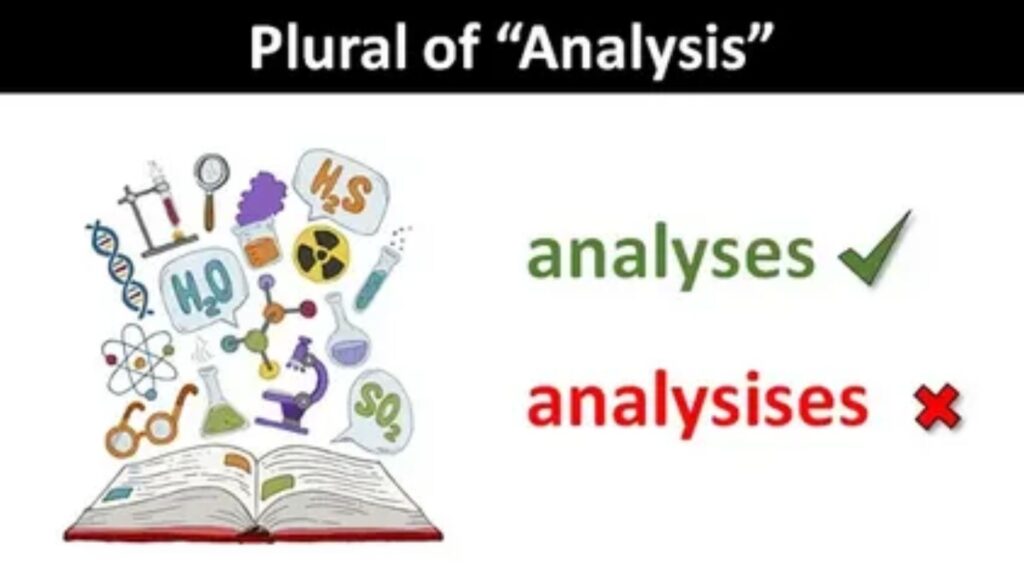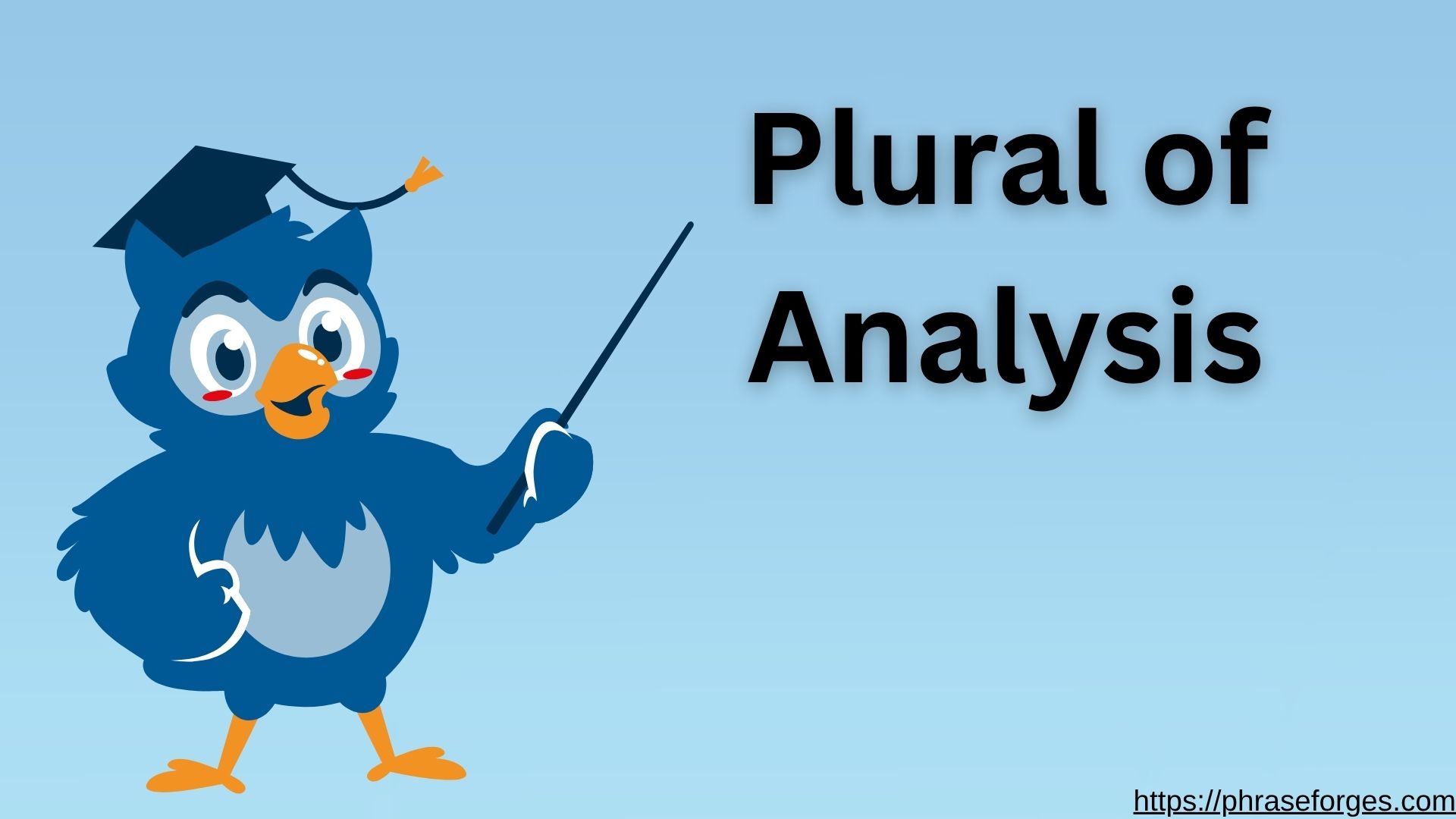If you’ve ever found yourself writing a report or email and pausing mid-sentence wondering, “Is it analysis or analyses?” you’re not alone. This word trips up even seasoned professionals. But don’t worry: by the end of this article, you’ll know exactly when and how to use the plural form of analysis, and you’ll do it with confidence.
Let’s break it down step by step, with real-world examples, grammar patterns, and an easy-to-follow explanation that actually sticks.
Keyword + Intro Explanation

So, what is the plural of analysis?
The correct plural is analyses.
Yes, it looks strange. Yes, it sounds even stranger when you first say it aloud. But this irregular form follows a very logical rule once you understand where it comes from.
“Analysis” is a word with Greek roots, and like many Greek-origin English words, it follows the -sis to -ses pluralization pattern. This is a classic example of a Greek-based irregular plural noun.
Simple Definition + Usage Overview
Let’s quickly define the word before jumping into plural forms:
- Analysis (noun, singular): A detailed examination of something to understand it better.
- Analyses (noun, plural): Multiple examinations or investigations of different things or different aspects of the same thing.
In short:
You conduct an analysis of a report.
You compare multiple analyses from various departments.
Clear Rules & Patterns
You might be wondering: Why not just add an “s” to make it plural? English loves to break its own rules, especially when dealing with words from Greek and Latin.
Here’s the rule that applies:
🔤 If a word ends in -sis and comes from Greek, its plural often ends in -ses.
Let’s look at some similar words:
| Singular | Plural |
|---|---|
| analysis | analyses |
| crisis | crises |
| diagnosis | diagnoses |
| thesis | theses |
| hypothesis | hypotheses |
These aren’t just vocabulary words they follow a morphological pattern known as the -sis to -ses transformation, which is a common rule for Greek noun pluralization in English.
Multiple Example Sentences
Let’s explore this visually and contextually:
✅ Correct Usage
- “Her analysis of the data was incredibly thorough.”
- “The analyses conducted by the research team were consistent across departments.”
- “Each department submitted its own analysis, and the executive team reviewed all analyses together.”
❌ Incorrect Usage
- “Several analysis were conducted last week.”
(Wrong: should be “analyses”) - “Their analysises are pending review.”
(Wrong: “analysises” is not a word)
Tip: When in doubt, swap the word with something simpler like report or study. If you’d say reports, then you need to use analyses.
Bulleted Rules with Do’s and Don’ts
✅ Do:
- Use “analysis” when referring to a single evaluation or report.
- Use “analyses” when referencing multiple examinations or comparisons.
- Pronounce “analyses” as uh-NAL-uh-seez.
❌ Don’t:
- Add “-s” or “-es” directly to “analysis.” It won’t work.
- Say or write “analysises.” That’s a made-up word.
- Confuse analysis with analytics or evaluation they’re related, but not the same.
📧 Scenario Example (Professional Email)
Subject: Follow-Up on Team Analyses
Hi Morgan,
I’ve reviewed the analyses you and your team submitted last week. Each analysis covered a key metric we’ve been tracking, and the insights you provided were incredibly helpful.
Let’s schedule a call to discuss the individual analyses before we finalize the Q3 strategy.
Best,
Rachel
Notice how analysis refers to each individual report, and analyses refers to the group of reports as a whole.
Before/After Examples in Context
| ❌ Incorrect | ✅ Correct |
|---|---|
| “We conducted three analysis.” | “We conducted three analyses.” |
| “The marketing analysises were late.” | “The marketing analyses were late.” |
| “Here’s a summary of our past analysis.” (referring to many) | “Here’s a summary of our past analyses.” |
Quick Reference Table
Here’s a handy cheat sheet for your next report:
| Term | Part of Speech | Plural Form | Sample Sentence |
|---|---|---|---|
| Analysis | Noun (singular) | Analyses | “The analysis was insightful.” |
| Analyses | Noun (plural) | — | “Their analyses revealed key trends.” |
Common Mistakes & Fixes
| Mistake | Why It’s Wrong | Correct Version |
|---|---|---|
| “The analysises were incorrect.” | Incorrect plural spelling | “The analyses were incorrect.” |
| “Each team did an analyses.” | Using plural when singular is needed | “Each team did an analysis.” |
| “What’s the analysis plural?” | Informal or vague phrasing | “What’s the plural of analysis?” |
Semantic Connection: Related Greek Nouns
Want to reinforce your understanding? Let’s compare analysis with other similar words that follow the same plural rule:
| Singular | Plural |
|---|---|
| diagnosis | diagnoses |
| crisis | crises |
| hypothesis | hypotheses |
| synthesis | syntheses |
| thesis | theses |
| nemesis | nemeses |
They all follow the same -sis to -ses structure so once you’ve learned one, you’ve learned many.
🧠 Origin & Etymology
The word analysis comes from the Greek word “analusis”, which means “a breaking up.” This makes perfect sense when you think about what analysis does it breaks complex things into understandable pieces. Knowing the etymology helps you understand why the plural is “analyses.”
This is a great example of how etymology influences modern grammar rules especially in words borrowed from classical languages.
🧪 Educational Use: Ideal for Academic & Scientific Contexts
Because “analysis” is a word rooted in academic, scientific, and data-driven writing, getting the plural form right is especially important. You’ll see “analyses” frequently in:
- Research papers
- Scientific journals
- Market research reports
- Legal briefs
- Thesis writing
And of course emails at work.
Final Thoughts

So, let’s answer it clearly one more time:
What’s the plural of analysis?
✅ It’s analyses.
It may feel unusual at first, but once you’ve seen it in action and used it in your own writing it’ll stick.
Here’s the bottom line:
- “Analysis” = one deep study
- “Analyses” = more than one
- Never, ever write “analysises”
Bonus Tip 🎯
When editing or proofreading your own writing, search for the word “analysis.” If you’re referring to more than one, make sure it ends in “-ses,” not “-sis.”
That one letter swap can make your writing sound far more polished and precise especially in professional or academic settings.

